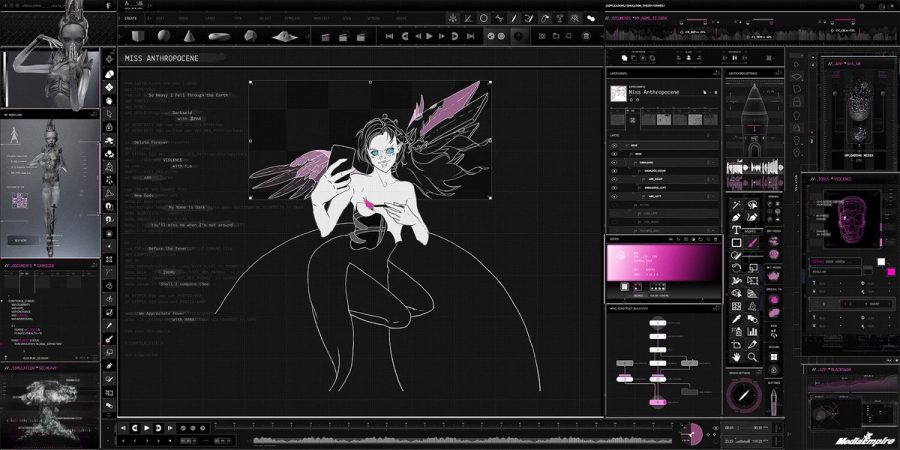In an interview with “Culture,” avant-pop musician Grimes called her 2015 album “Art Angels” “a piece of crap.” It’s unusual to hear an artist decry their older work in such a way, especially when the album they’re talking about is one of the most critically-acclaimed musical works of the 21st century. Such a statement also carries with it the implicit message that the follow-up will be leagues better. Does Grimes’s futuristic 2020 pop album, “Miss Anthropocene,” live up to that hype?
While not a perfect album, the highs of “Miss Anthropocene” are extraordinary. “Violence” is hypnotic, the breakbeat on “4ÆM” is transcendent, “My Name is Dark” is a pessimistic emo masterpiece, and “IDORU” is a perfect light at the end of the dark, dark tunnel that is this album. By contrast, the album’s lows can be easily ignored. It’s easy to understand why Lil Uzi Vert allegedly refused to use the mediocre beat for “Darkseid,” “New Gods” is the most cliched attempt at being sinister I have ever heard, and “Before the fever” is just plain forgettable, but none of these issues are especially egregious. It was also an odd choice for Grimes to make two of the album’s slowest, grimmest songs the first two tracks, especially considering how short the album is overall, but this choice doesn’t make listening to the album feel too slow or drawn-out. Taken together, the album’s 10 tracks paint a dystopian world in broad, but nonetheless vivid, strokes.
“Miss Anthropocene” isn’t a unique, once-in-a-lifetime experience like “Art Angels,” nor is it a boundary-pushing statement like her 2012 album “Visions,” but it’s certainly not bad by any means. All things considered, I liked “Miss Anthropocene” well enough, but I don’t think I’ll listen to it again. It feels flat; something about it doesn’t sit right with me.
“Miss Anthropocene” posits (correctly, it seems) that the world is a scary place to live in nowadays. Its songs are all about abusive relationships, climate change, pollution, the evils of social media, the opioid crisis, and other similarly depressing topics. But what exactly does it do with this idea? Does it indulge in and investigate the profound sadness felt by people all across the world? No; it’s too dancy, too poppy, too fun. Does it instead find respite in life’s small pleasures, offering momentary peace to all who listen? Again, no. “Miss Anthropocene” is infatuated with the doom and gloom of our modern world, and it never once looks away.
Grimes isn’t celebrating in spite of society’s ills; she’s celebrating because of them (this explains the “global warming is good” marketing campaign around the release of this album). With “Miss Anthropocene,” Grimes attempts to turn real human suffering into something abstract, exploiting it to build her privileged goth/cyberpunk aesthetic. This uncomfortable truth lies at the core of the album, and it casts a shadow over all of the album’s good musical moments. When there are artists who have pulled off the same concept better and with less subtextual baggage, why even listen to “Miss Anthropocene?”
If you’re interested in the ideas “Miss Anthropocene” puts forward but would like to see them executed with more finesse, I recommend Anohni’s “HOPELESSNESS.” Back in 2016, the album deftly explored the soul-crushing state of the world, and it’s filled to the brim with pop-adjacent songs that appropriately balance genuine sadness with compassion and nonobstructive, boundary-pushing EDM production.












